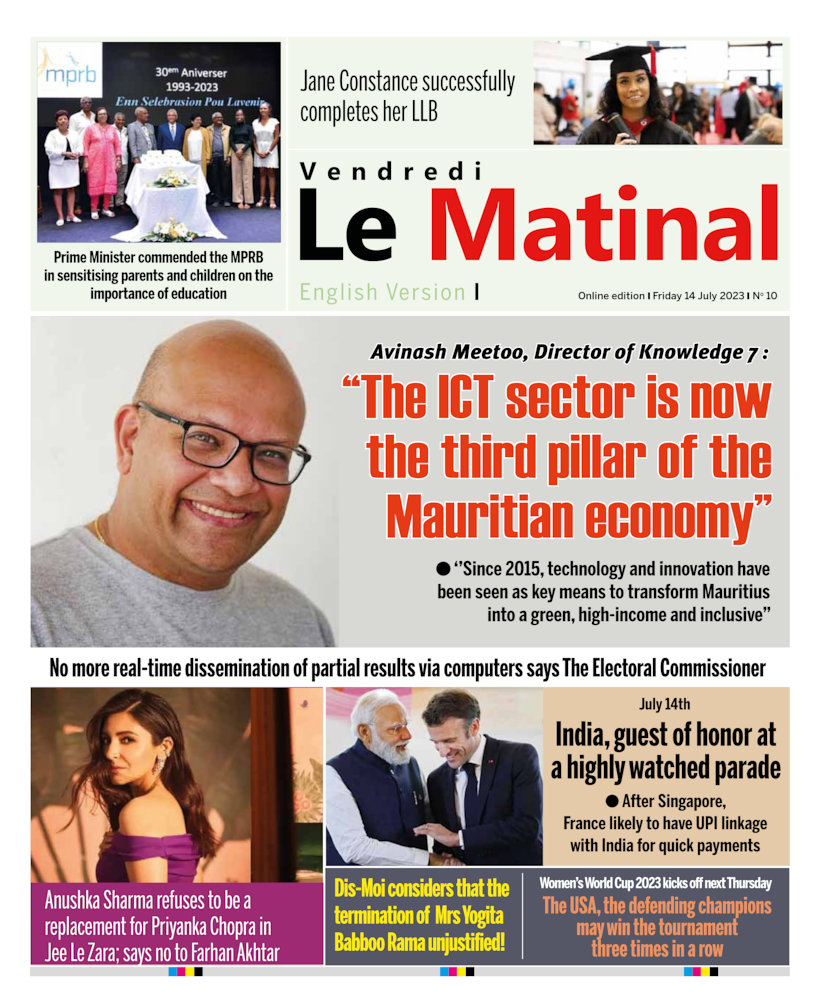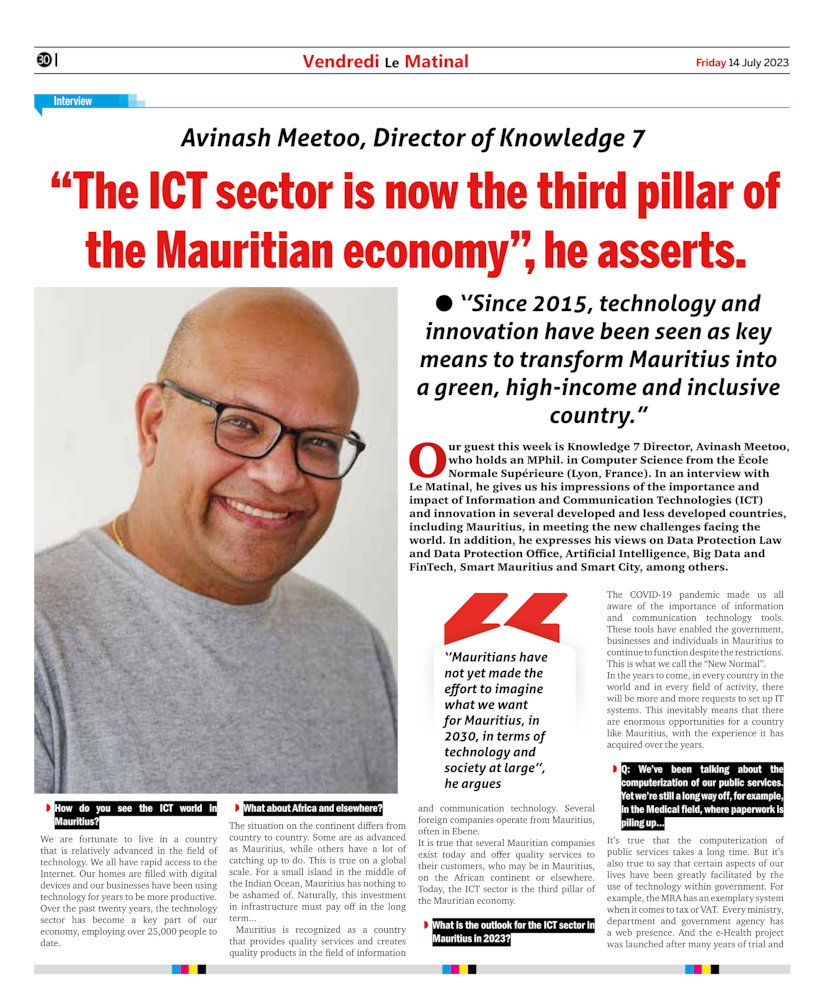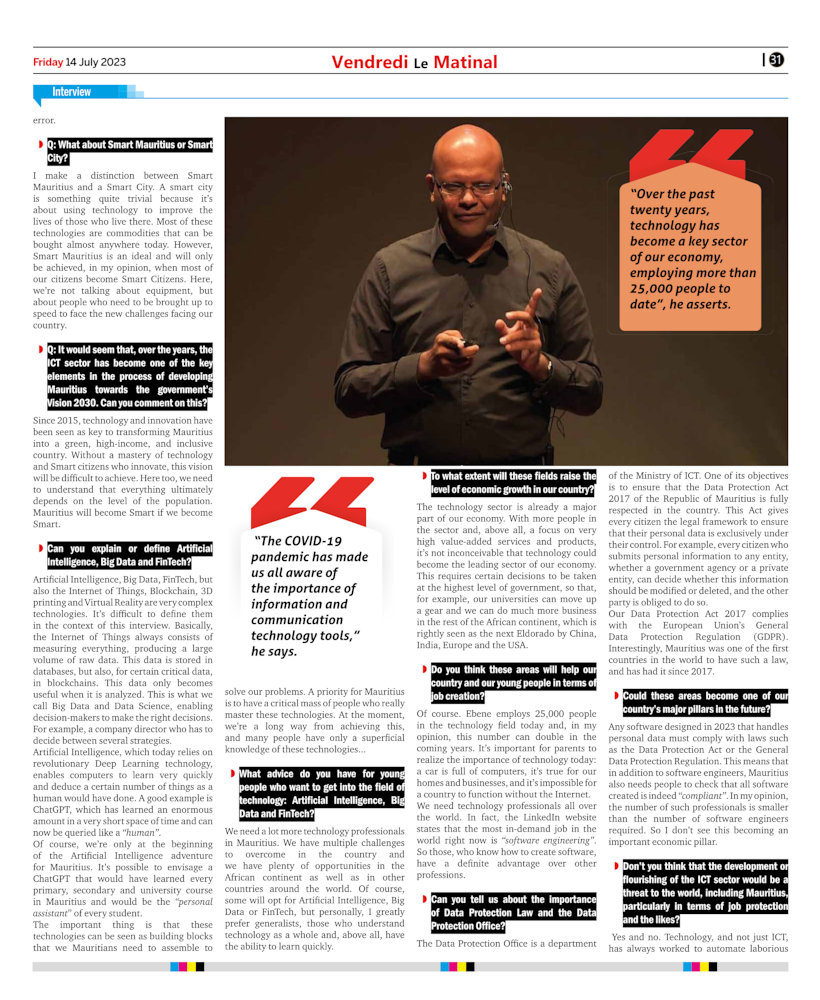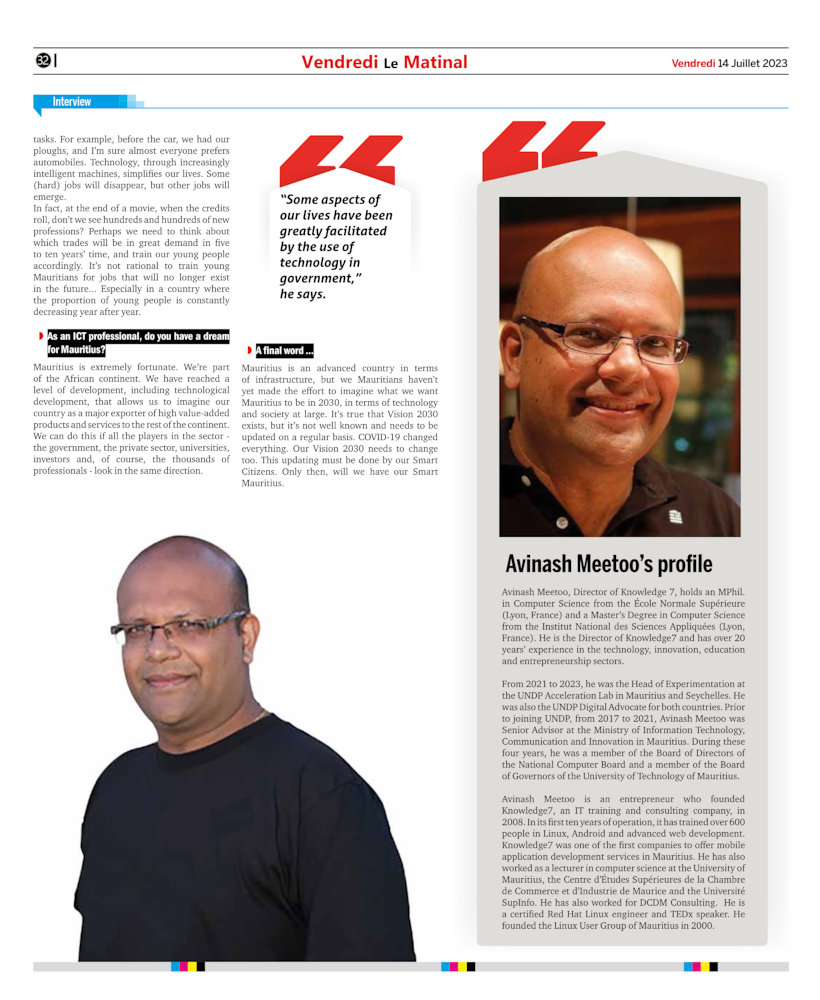I gave an interview on Friday 14 July 2023 in the online edition of Le Matinal, in both French and English, on the evolution of technology in Mauritius and its impact on our future. This interview was done by Mr Sanjay Bijloll.
How do you see the ICT world in Mauritius?
We are fortunate to live in a country that is relatively advanced in the field of technology. We all have rapid access to the Internet. Our homes are filled with digital devices and our businesses have been using technology for years to be more productive. Over the past twenty years, the technology sector has become a key part of our economy, employing over 25,000 people to date.
What about Africa and elsewhere?
The situation on the continent differs from country to country. Some are as advanced as Mauritius, while others have a lot of catching up to do. This is true on a global scale. For a small island in the middle of the Indian Ocean, Mauritius has nothing to be ashamed of. Naturally, this investment in infrastructure must pay off in the long term…
Mauritius is recognized as a country that provides quality services and creates quality products in the field of information and communication technology. Several foreign companies operate from Mauritius, often in Ebene.
It is true that several Mauritian companies exist today and offer quality services to their customers, who may be in Mauritius, on the African continent or elsewhere. Today, the ICT sector is the third pillar of the Mauritian economy.
What is the outlook for the ICT sector in Mauritius in 2023?
The COVID-19 pandemic made us all aware of the importance of information and communication technology tools. These tools have enabled the government, businesses and individuals in Mauritius to continue to function despite the restrictions. This is what we call the “New Normal”.
In the years to come, in every country in the world and in every field of activity, there will be more and more requests to set up IT systems. This inevitably means that there are enormous opportunities for a country like Mauritius, with the experience it has acquired over the years.
We’ve been talking about the computerization of our public services. Yet we’re still a long way off, for example, in the Medical field, where paperwork is piling up…
It’s true that the computerisation of public services takes a long time. But it’s also true to say that certain aspects of our lives have been greatly facilitated by the use of technology within government. For example, the MRA has an exemplary system when it comes to tax or VAT. Every ministry, department and government agency has a web presence. And the e-Health project was launched after many years of trial and error.
What about Smart Mauritius or Smart City?
I make a distinction between Smart Mauritius and a Smart City. A smart city is something quite trivial because it’s about using technology to improve the lives of those who live there. Most of these technologies are commodities that can be bought almost anywhere today. However, Smart Mauritius is an ideal and will only be achieved, in my opinion, when most of our citizens become Smart Citizens. Here, we’re not talking about equipment, but about people who need to be brought up to speed to face the new challenges facing our country.
It would seem that, over the years, the ICT sector has become one of the key elements in the process of developing Mauritius towards the government’s Vision 2030. Can you comment on this?
Since 2015, technology and innovation have been seen as key to transforming Mauritius into a green, high-income, and inclusive country. Without a mastery of technology and Smart citizens who innovate, this vision will be difficult to achieve. Here too, we need to understand that everything ultimately depends on the level of the population. Mauritius will become Smart if we become Smart.
Can you explain or define Artificial Intelligence, Big Data and FinTech?
Artificial Intelligence, Big Data, FinTech, but also the Internet of Things, Blockchain, 3D printing and Virtual Reality are very complex technologies. It’s difficult to define them in the context of this interview. Basically, the Internet of Things always consists of measuring everything, producing a large volume of raw data. This data is stored in databases, but also, for certain critical data, in blockchains. This data only becomes useful when it is analyzed. This is what we call Big Data and Data Science, enabling decision-makers to make the right decisions. For example, a company director who has to decide between several strategies.
Artificial Intelligence, which today relies on revolutionary Deep Learning technology, enables computers to learn very quickly and deduce a certain number of things as a human would have done. A good example is ChatGPT, which has learned an enormous amount in a very short space of time and can now be queried like a “human”.
Of course, we’re only at the beginning of the Artificial Intelligence adventure for Mauritius. It’s possible to envisage a ChatGPT that would have learned every primary, secondary and university course in Mauritius and would be the “personal assistant” of every student.
The important thing is that these technologies can be seen as building blocks that we Mauritians need to assemble to solve our problems. A priority for Mauritius is to have a critical mass of people who really master these technologies. At the moment, we’re a long way from achieving this, and many people have only a superficial knowledge of these technologies…
What advice do you have for young people who want to get into the field of technology: Artificial Intelligence, Big Data and FinTech?
We need a lot more technology professionals in Mauritius. We have multiple challenges to overcome in the country and we have plenty of opportunities in the African continent as well as in other countries around the world. Of course, some will opt for Artificial Intelligence, Big Data or FinTech, but personally, I greatly prefer generalists, those who understand technology as a whole and, above all, have the ability to learn quickly.
To what extent will these fields raise the level of economic growth in our country?
The technology sector is already a major part of our economy. With more people in the sector and, above all, a focus on very high value-added services and products, it’s not inconceivable that technology could become the leading sector of our economy. This requires certain decisions to be taken at the highest level of government, so that, for example, our universities can move up a gear and we can do much more business in the rest of the African continent, which is rightly seen as the next Eldorado by China, India, Europe and the USA.
Do you think these areas will help our country and our young people in terms of job creation?
Of course. Ebene employs 25,000 people in the technology field today and, in my opinion, this number can double in the coming years. It’s important for parents to realize the importance of technology today: a car is full of computers, it’s true for our homes and businesses, and it’s impossible for a country to function without the Internet. We need technology professionals all over the world. In fact, the LinkedIn website states that the most in-demand job in the world right now is “software engineering”. So those, who know how to create software, have a definite advantage over other professions.
Can you tell us about the importance of Data Protection Law and the Data Protection Office?
The Data Protection Office is a department of the Ministry of ICT. One of its objectives is to ensure that the Data Protection Act 2017 of the Republic of Mauritius is fully respected in the country. This Act gives every citizen the legal framework to ensure that their personal data is exclusively under their control. For example, every citizen who submits personal information to any entity, whether a government agency or a private entity, can decide whether this information should be modified or deleted, and the other party is obliged to do so.
Our Data Protection Act 2017 complies with the European Union’s General Data Protection Regulation (GDPR). Interestingly, Mauritius was one of the first countries in the world to have such a law, and has had it since 2017.
Could these areas become one of our country’s major pillars in the future?
Any software designed in 2023 that handles personal data must comply with laws such as the Data Protection Act or the General Data Protection Regulation. This means that in addition to software engineers, Mauritius also needs people to check that all software created is indeed “compliant”. In my opinion, the number of such professionals is smaller than the number of software engineers required. So I don’t see this becoming an important economic pillar.
Don’t you think that the development or flourishing of the ICT sector would be a threat to the world, including Mauritius, particularly in terms of job protection and the likes?
Yes and no. Technology, and not just ICT, has always worked to automate laborious tasks. For example, before the car, we had our ploughs, and I’m sure almost everyone prefers automobiles. Technology, through increasingly intelligent machines, simplifies our lives. Some (hard) jobs will disappear, but other jobs will emerge.
In fact, at the end of a movie, when the credits roll, don’t we see hundreds and hundreds of new professions? Perhaps we need to think about which trades will be in great demand in five to ten years’ time, and train our young people accordingly. It’s not rational to train young Mauritians for jobs that will no longer exist in the future… Especially in a country where the proportion of young people is constantly decreasing year after year.
As an ICT professional, do you have a dream for Mauritius?
Mauritius is extremely fortunate. We’re part of the African continent. We have reached a level of development, including technological development, that allows us to imagine our country as a major exporter of high value-added products and services to the rest of the continent. We can do this if all the players in the sector – the government, the private sector, universities, investors and, of course, the thousands of professionals – look in the same direction.
A final word …
Mauritius is an advanced country in terms of infrastructure, but we Mauritians haven’t yet made the effort to imagine what we want Mauritius to be in 2030, in terms of technology and society at large. It’s true that Vision 2030 exists, but it’s not well known and needs to be updated on a regular basis. COVID-19 changed everything. Our Vision 2030 needs to change too. This updating must be done by our Smart Citizens. Only then, will we have our Smart Mauritius.





Leave a Reply